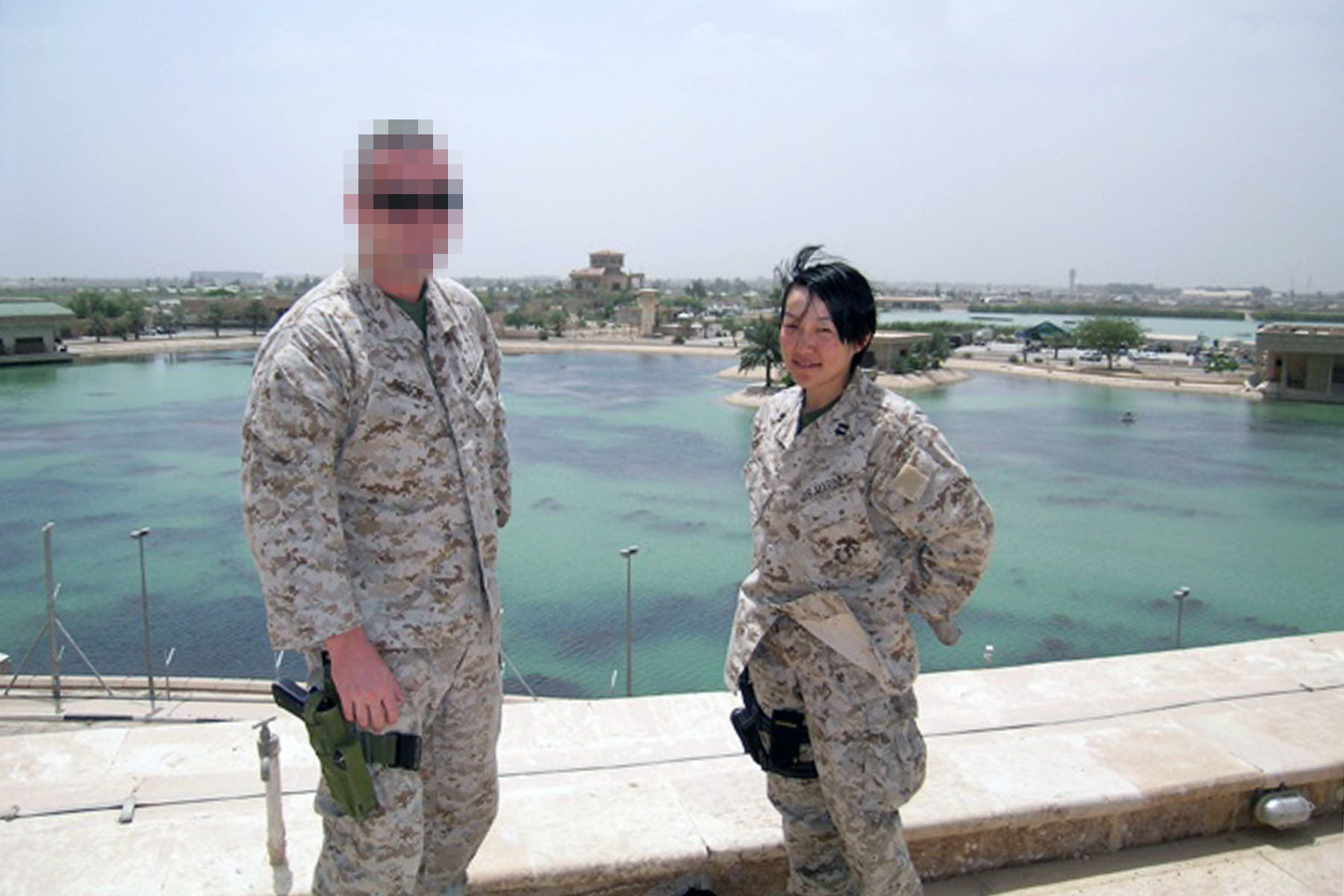Your trusted source for contextualizing LGBTQ+ and military news. Sign up for our daily newsletter.
Jules Sohn was a first lieutenant and one of the only women officers in command at the recruiting station at Parris Island, South Carolina. They also had a girlfriend — something they had to be cautious about in the early 2000s because of the military’s policy banning LGBTQ+ service members from being openly queer. Sohn lived in Georgia, about an hour-and-a-half drive away, to help compartmentalize their personal life from the military one. Sohn already felt too visible as one of the few Korean Americans on base. Then, rumors began to spread among the Marines that there was a woman officer who never seemed to have any boyfriends.
“My blood pressure started going up,” said Sohn, now 46. “I used to run all these half marathons, so I was very fit. But the stress of being outed and possibly discharged was starting to give me high blood pressure. I decided to go to grad school as a kind of clean break — not necessarily because I wanted to leave but because I could feel that living the double life of being in the Marines and keeping my personal life separate was definitely causing a personal toll.”
Sohn left active duty but was recalled later to serve in a reserve unit. They deployed for seven months during Operation Iraqi Freedom as a public affairs officer. Upon their return stateside, Sohn said a group of LGBTQ+ veterans reached out to see if they would help advocate for the repeal of ‘Don’t Ask, Don’t Tell.’
“For me, I remember thinking I am willing to do it for the greater good and for other people who don’t have the voice or don’t feel comfortable in that space,” Sohn said. “So I spoke to different groups and universities.”
-
Read Next:
That caught officials’ attention. In April 2008, after four years in active duty and nearly four years in the reserves, Sohn received their involuntary discharge. They were only a few months from completing their contract.
Sohn and other LGBTQ+ veterans in August filed a class-action lawsuit in the U.S. District Court for the Northern District of California against the Pentagon for what they called “ongoing discrimination” perpetuated by their military discharge papers and by policies that leave the burden on veterans to seek justice. These veterans are calling on the Pentagon to remove any information about their sexual orientation in discharge papers and to upgrade the discharge statuses of the tens of thousands of veterans who were dishonorably discharged under Don’t Ask, Don’t Tell.
Veterans who receive discharges less than Honorable — including General Discharge Under Honorable Conditions, Other Than Honorable and Dishonorable — can be barred from accessing a wide range of benefits typically offered to veterans, including health care, funding for higher education, home loan financing, employment preference credits, compensation and pension, homeless programs and burial benefits.

LGBTQ+ people were barred from serving in the military before Don’t Ask, Don’t Tell went into effect in 1994. From 1980 to 2011, more than 35,000 service members were discharged for their actual or perceived sexual orientation, according to new figures obtained by Legal Aid at Work through a Freedom of Information Act request. Don’t Ask, Don’t Tell was repealed September 20, 2011, and veterans can now apply for an upgraded discharge status. However, according to government data, only about 1,300 veterans have been granted upgrades.
Because so few LGBTQ+ veterans discharged under the ‘Don’t Ask, Don’t Tell’ policy actually applied for a discharge upgrade, the VA issued guidance on how to apply on the 10th anniversary of the repeal.
Jocelyn Larkin, a lawyer representing the LGBTQ+ veterans, said that she tried to go through the process on her own and that it was “incredibly difficult” even though she is an experienced attorney. Veterans, some of whom were traumatized by the experience they had, are required to request their military records from the government — which can take years — then fill out paperwork that is not easy to understand without a lawyer. Veterans also need access to a computer and broadband to attach supplemental materials, which Larkin said is another barrier for those who are homeless or use only smartphones.
“Don’t make people jump through hoops,” Larkin said. “Don’t make them bear the burden of proof when the military already knows who they discharged because of their sexual preference or orientation.”
-
Read Next:
Larkin said the extremely small number of discharge changes since Don’t Ask, Don’t Tell was repealed shows that the “process is not working.”
“We are extremely optimistic because what’s the military going to say?” Larkin said. “Their own statistics show how long it takes to get through the process. The White House has also said publicly that they think this ought to be done, so we’re inviting them to do so.”
In response to a request for comment, a Pentagon spokesperson said it was “inappropriate to comment on pending litigation.”
Dr. Heather Sperry, a psychologist and the LGBTQ+ Program Manager at Veterans Affairs Indiana who has worked with and advocated for hundreds of LGBTQ+ veterans, said she thinks the government could do a better job communicating that options are available and showing these veterans that the military’s culture is changing.
“All of this circles back to the need for continued cultural transformation,” Sperry said. “‘Don’t Ask, Don’t Tell’ was never a VA policy; it was a Department of Defense policy. However, we know that it still impacts veterans’ perceptions of VA, and so we need to make sure that LGBTQ+ veterans know that they are welcome.”
Sperry said she’s heard it takes some veterans months or years to get discharge statuses updated.
“It’s not a simple process, even if there have been efforts to make it easier and more accessible,” Sperry said. “I also think LGBTQ+ veterans are used to systemic discrimination, so there might be an assumption from some folks within the population that they will go through an entire process like this and then still not get the outcome that they have earned or is deserved.”
Lilly Steffanides, one of the plaintiffs in the case who was given an Other Than Honorable discharge from the Navy, said they experienced harassment on their ship, followed by homelessness and shame. Other Than Honorable discharges — not as severe as Dishonorable discharges — are the result of disciplinary issues, such as lapses in military order or failing a drug test, and result in the loss of VA benefits.
“After many years, I reconnected with the veteran community and do my best to act as a leader and supporter for other LGBTQ+ veterans like me,” Steffanides said in a statement. “I am joining this lawsuit because I want justice for my LGBTQ+ brothers and sisters, and I want my service to my country to be recognized as honorable.”
Sherrill Farrell, another plaintiff in the case and U.S. Navy veteran, said she wanted to follow in the footsteps of her father, who served in the Air Force for more than two decades, and her grandfather, an Army officer during World War II. Her service in the Navy, however, was cut short when she was discharged with Other Than Honorable status because of her sexual orientation.

“This was devastating to me and has always made me feel as though my service was less valuable than heterosexual veterans,” Farrell said in a statement. “Today, I am proud of my country and proud of who I am.”
Steven Egland, another plaintiff and an Army veteran, said the circumstances and language of his discharge were a painful reminder of the trauma he experienced being discharged. Though the government has long acknowledged that its discrimination against LGBTQ+ service members was wrong, England said it still needs to “rectify it by correcting our records.”
“For many years I never disclosed my service in the military,” Egland said in a statement. “Having an updated DD-214 would bring me so much healing and would restore my own pride in my service to this country.”
For Sohn, the lawsuit is a matter of “finally being seen” and LGBTQ+ veterans’ service being acknowledged by others but also remembered with pride. Many of those discharged with less than Honorable status don’t even view themselves as veterans, Sohn said.
“When ‘Don’t Ask, Don’t Tell’ was repealed, we were very excited — but the real work is actually this part, right?” Sohn said. “It’s about all the folks that were left behind. So now we have a duty to bring them back up with us and carry them with us.”








